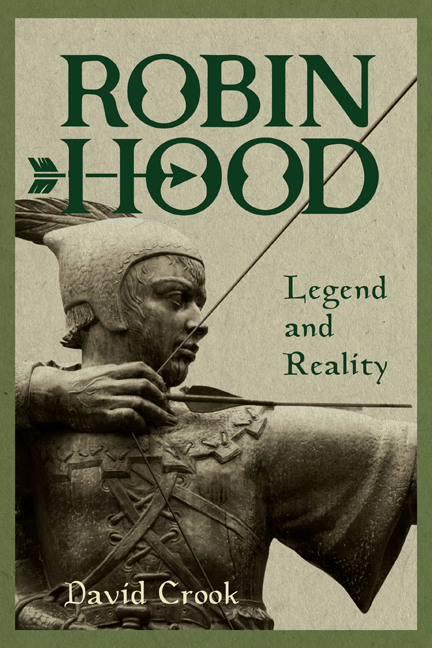Book contents
- Frontmatter
- Dedication
- Contents
- List of Maps and Illustrations
- Preface and Acknowledgements
- List of Abbreviations
- Introduction
- PART I THE LEGEND AND ITS INTERPRETERS
- Chapter 1 The Medieval Tales of Robin Hood
- Chapter 2 Chroniclers, Revellers, Playwrights and Antiquarians, c.1420–1765
- Chapter 3 Editors, the Folklorist and the Archivist, 1765–1889
- Chapter 4 Folklorists, Literary Scholars and Historians: Robin Hood in the Twentieth Century
- Chapter 5 The Robin Hood Places
- PART II OUTLAW AND EVILDOER OF OUR LAND: THE ORIGINAL ROBIN HOOD
- Chapter 6 The Robin Hood Names
- Chapter 7 Robin Hood and Criminality
- Chapter 8 Law and Disorder in Yorkshire, 1215–1225
- Chapter 9 The Sheriff, the Fugitive and the Civil Servant
- Conclusion
- Bibliography
- Index
- Frontmatter
- Dedication
- Contents
- List of Maps and Illustrations
- Preface and Acknowledgements
- List of Abbreviations
- Introduction
- PART I THE LEGEND AND ITS INTERPRETERS
- Chapter 1 The Medieval Tales of Robin Hood
- Chapter 2 Chroniclers, Revellers, Playwrights and Antiquarians, c.1420–1765
- Chapter 3 Editors, the Folklorist and the Archivist, 1765–1889
- Chapter 4 Folklorists, Literary Scholars and Historians: Robin Hood in the Twentieth Century
- Chapter 5 The Robin Hood Places
- PART II OUTLAW AND EVILDOER OF OUR LAND: THE ORIGINAL ROBIN HOOD
- Chapter 6 The Robin Hood Names
- Chapter 7 Robin Hood and Criminality
- Chapter 8 Law and Disorder in Yorkshire, 1215–1225
- Chapter 9 The Sheriff, the Fugitive and the Civil Servant
- Conclusion
- Bibliography
- Index
Summary
The radical ideas about the origins of the legend of Robin Hood proposed in this book were made possible only by the results of the painstaking work of generations of archivists and record scholars of the earliest surviving records of English government. That work was carried out between the beginning of the nineteenth century and the early years of the twenty-first, and took place initially under the auspices of the six Record Commissions between 1800 and 1837, before the establishment of the Public Record Office in 1838. The Rev. Joseph Hunter, already a noted antiquary, became one of the first generation of assistant keepers of public records. From 1843 to 1858 he was, in the words of his distinguished colleague Henry Cole, ‘employed on the highly important business of arranging the 4,000 bushels of miscellaneous records of the Queen's Remembrancer's Office of the Exchequer, which had been formally abolished only a decade previously. His fellow assistant keepers, including Cole, carried out similar work on the records of other departments of the Exchequer, and of the Chancery and courts of common law, in other record offices in the capital, until they were finally brought together in the new Public Record Office building on the Rolls Estate in Chancery Lane in 1859. Among the records under his charge and which came to light as he worked, Hunter made what he thought was a very exciting discovery. In an account of the king's Chamber under Edward II he found records of payments to Robert Hod, a lowly porter, which he thought might relate to both a section of the Gest of Robin Hood and to real events which took place in the early 1320s. He wrote a lengthy paper based upon them, published in 1852, suggesting that they might refer to the original legendary outlaw, Robin Hood. His ideas, initially received with interest among fellow antiquaries, were within a decade savagely criticised and ridiculed, and this may have had the long-term effect of discouraging any others who might have been tempted to undertake further research into the subject in documentary sources.
- Type
- Chapter
- Information
- Robin Hood: Legend and Reality , pp. 256 - 259Publisher: Boydell & BrewerPrint publication year: 2020



